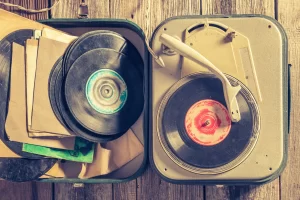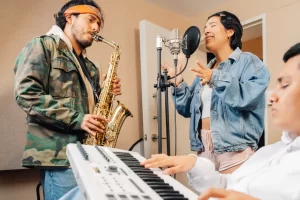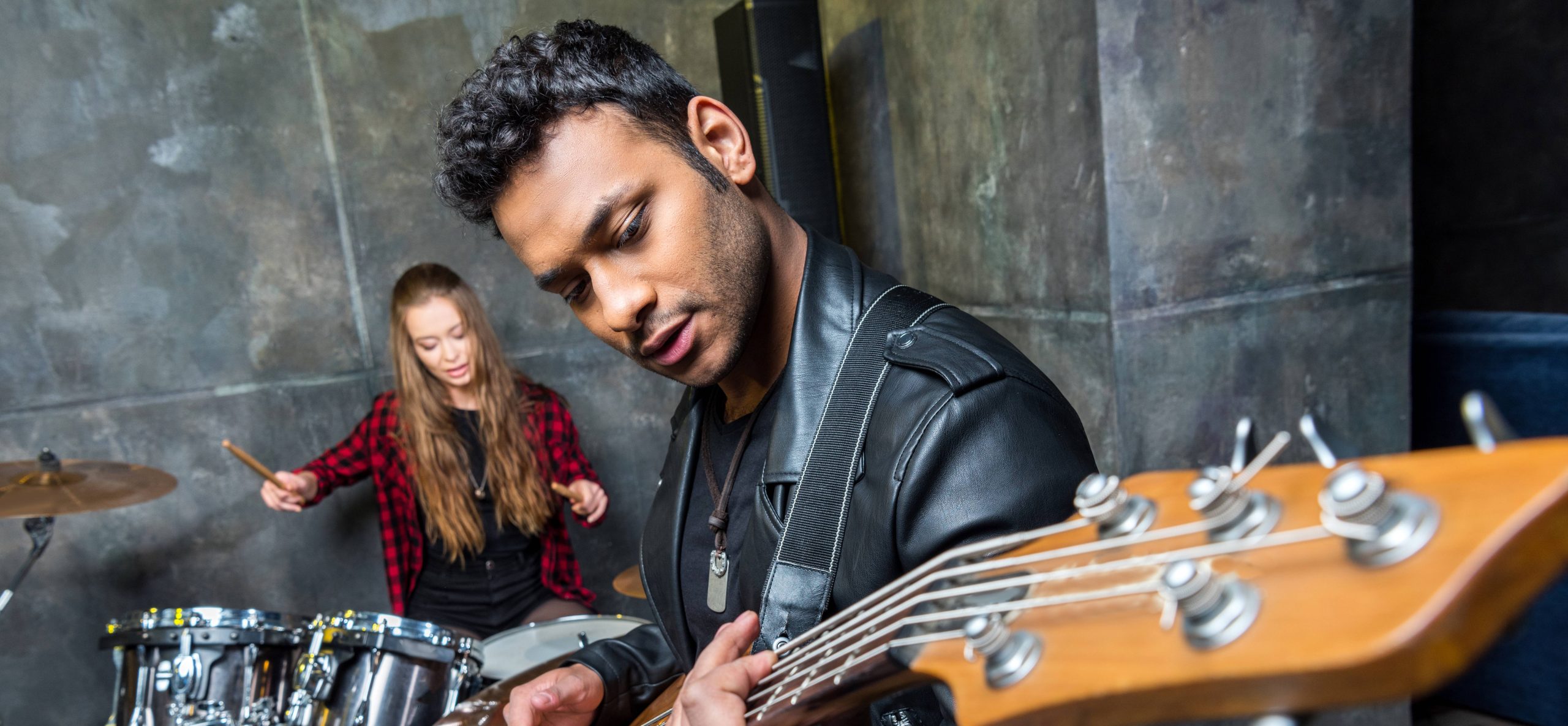It’s no secret that many musicians smoke weed. In fact, for some, it seems to be an essential part of their creative process.
But does weed actually make you a better musician? Does it help you come up with new ideas or make your music sound better? Or is it all just a myth?
In this article, we’ll take a closer look at the relationship between weed and music. We’ll discuss why so many musicians smoke weed and whether or not there is any merit to their claims that it helps them create better music.
We’ll also explore the possible side effects of smoking weed and how it can impact your ability to perform on stage or in the studio. So, if you’re curious about the link between weed and music, keep reading!
How Marijuana Affects the Brain
Understanding how weed affects the brain is key to understanding its potential impact on music. So, let’s break it down.
Marijuana contains THC, or tetrahydrocannabinol, the primary psychoactive compound in cannabis. It’s what gives users a “high” feeling. THC binds to cannabinoid receptors in the brain and alters neurotransmitter function.
Our bodies make cannabinoids to blunt and regulate the effects of certain neurotransmitters. THC mimics our own natural cannabinoids in chemical makeup, but THC doesn’t regulate neurotransmitters in the same way.
Take the neurotransmitter dopamine, for example. Dopamine plays a major role in motivation, pleasure, and reward-seeking behavior. It gives a feeling of happiness and well-being.
However, weed triggers a larger release of dopamine than is natural. This can cause addiction and result in mood, perception, and cognition changes.
In small doses, THC can increase dopamine levels and produce feelings of euphoria. That’s why people who smoke weed often say it makes them feel happy and relaxed. But in larger doses, THC can decrease dopamine levels and cause anxiety or paranoia.
Creative People, Neurotransmitters, and Weed
Before we move on to the pros and cons of using marijuana while you play music, we need to cover one more thing. Whether or not marijuana helps or harms a musician’s career depends solely on their neurotransmitter functioning before use.
Your brain chemistry makeup is hereditary. Some people have fewer available synapsis than others, and some may not recycle their neurotransmitters as efficiently. The compounds in marijuana will directly affect these areas.
This is why weed affects people differently.
Most creative people have a deficiency in neurotransmitter function. This variance allows them to be more open-minded and see the world differently. But unfortunately, they’re also more prone to anxiety, depression, and addiction.
Maybe the reason that weed and musicians are historically synonymous is that more creative people tend to smoke. Not that weed truly makes us more creative. The creatives are self-medicating to enhance their neurotransmitter functioning.
For creative people, marijuana can be a double-edged sword. Understanding your brain chemistry before deciding whether to smoke weed while making music is essential.
Positive Aspects of Marijuana Use for Musicians
Many people believe that weed and music go hand-in-hand. It’s true that some of the ways that THC influences neurotransmitters can be positive for musicians.
That said, since marijuana affects everyone differently, what works for one person might not work for another.
There are many reasons why so many musicians say they smoke weed. Here are some of them:
1. Increased Creativity: Some musicians claim that marijuana helps them become more creative. They say it makes them less self-conscious and more open to new ideas.
Although some studies say, highly potent marijuana impairs divergent thinking. THC reduces inhibitory control (less filtering) and stimulates dopamine release at the same time. The combination may contribute to higher creative freedom in certain people.
In a nutshell, whether or not you get a creativity boost from weed depends upon how creative you are to start with and the potency of the THC.
2. Greater Focus: For people with fewer cannabinoid receptors (such as ADD or ADHD), smoking weed helps them focus on the music and tune out distractions. Definitely helpful for musicians who want to get in the zone when they’re writing or practicing.
3. Less Performance Anxiety: Others claim that marijuana can help with performance anxiety too. This phenomenon comes from the reduction in inhibitory control.
If you’re nervous about playing in front of an audience, smoking weed beforehand might help you relax and focus on the music.
4. Pain Relief: For some musicians, marijuana is a way to relieve pain. If you have chronic pain or arthritis, smoking weed might help you manage your symptoms and play your instrument more comfortably.
One possible explanation is the effect of CBD (cannabidiol) on GABA receptors in the brain, resulting in decreased pain perception. GABA is a neurotransmitter that acts as our natural pain relief. It also plays a role in calming anxiety and stress.
5. Enhanced Sensual Pleasure: Some say that marijuana makes music sound better. Probably because THC affects the way we process sensory information.
For example, one study found that people who smoked weed before listening to music had a more intense emotional reaction to the music. This is because weed may create a mild form of synesthesia, resulting in a more intense experience.
Synesthesia is a condition where information from one of our senses gets partially processed in another area of our brain. The music might make you feel like you’re a part of it. You’re not just hearing it.
Synesthesia also works the same way for visual input. That’s why some people say they see colors when they listen to music.
Side Effects of Smoking Weed
Of course, there are also potential drawbacks to smoking weed as a musician. Here are some things to keep in mind:
1. Anxiety and Paranoia: As we mentioned above, THC can increase anxiety and paranoia depending on the dosage. One reason for this is that THC activates the sympathetic nervous system, which is responsible for the “fight-or-flight” response.
This state can cause a rapid heartbeat, sweating, and an increase in blood pressure. THC also interferes with memory and decision-making, which can further contribute to feelings of anxiety and paranoia.
For people prone to anxiety or panic attacks, smoking weed can trigger these episodes and make it difficult to relax and enjoy playing music.
2. Short-Term Memory Loss: One of weed’s most well-known side effects is short-term memory loss. It can make it difficult to remember things you just read or heard. So, smoking weed might not be the best idea if you’re trying to learn a new song or piece.
It can also make it challenging to use sheet music or remember choreography. It might also make it harder to focus on complex musical concepts.
3. Impaired Coordination and Motor Skills: Marijuana can also cause coordination problems. This can make it difficult to play your instrument with precision or sing.
4. Weed Hangovers: Many people report feeling groggy and fatigued the day after smoking weed, making it hard to focus on anything, let alone music.
5. Addiction: Finally, it’s important to remember that marijuana addiction is a real possibility. If you smoke weed frequently, you could develop a dependence on it. Needing to smoke weed to feel normal doesn’t sound like fun.
6. Physical Effects: It’s also worth noting that smoking weed can also have some adverse physical side effects. They include:
- Respiratory problems
- Increased heart rate
- Problems with coordination
- Memory problems
- Dry mouth
- Dizziness
- Difficulty concentrating
So, if you’re planning to smoke weed before a gig, you should know how it might impact your ability to play before you get on stage.
It would be embarrassing if you forgot the lyrics to your own song or couldn’t remember how to play your instrument. Or worse, if you started to get dizzy or felt like your heart was beating out of your chest.
Common Questions About Weed and Music
Now that you know how weed works in the brain, as well as the positive and negative aspects of using it, here are a few more questions that musicians often have:
Is there a difference between smoking and ingesting marijuana for musical purposes?
There are pros and cons to smoking and ingesting marijuana for musical purposes. Smoking is the most direct way to feel the effects of THC, but it also has the most potent side effects.
On the other hand, ingesting marijuana can take a bit longer to kick in, but it doesn’t have as many negative side effects.
Both smoking and ingesting marijuana are equally effective for creativity and stage fright. However, smoking might be more helpful if you struggle with pain relief. Ingesting marijuana might be better if you’re worried about memory loss or impaired motor skills.
What are the benefits of using marijuana as a musician compared to other drugs or alcohol?
Some musicians prefer to use marijuana to practice music because it’s a natural substance. It also has fewer adverse side effects than other drugs or alcohol. Additionally, unlike other substances, most people can still think and function well after using marijuana.
It’s also worth noting that marijuana can be helpful for some musical activities and not others. For example, it might help with improvisation but make it challenging to remember sheet music.
What are the alternatives to weed when it comes to increasing musical performance?
To enhance your brain chemistry naturally, try taking amino acids. These will increase neurotransmitter functioning in your brain. Get a boost in focus, creativity, and mood.
They’re in foods like fish, chicken, eggs, and dairy. You can also take amino acids in supplement form. Some great ones are True Focus and True Calm from the Now brand.
Another alternative is to try nootropics, which are cognitive enhancers. These are substances that can improve focus, concentration, and memory. Nootropics come in supplement form or some foods like green tea, dark chocolate, and coffee.
Caffeine is another option for increasing your energy and focus.
Some musicians perform better when they’re well-rested and eat nutritious meals. So, make sure to take care of your body and mind to increase your musical performance.
To Sum it Up
So, what’s the verdict? Does weed make you a better musician? It depends.
There is no definitive one-size-fits-all answer. Ultimately, the effects of cannabis on musicianship vary depending on the individual, their brain chemistry, and the dosage of weed.
For some people, marijuana can increase creativity, focus, and relaxation. But for others, it can cause anxiety, paranoia, and memory problems. Not to mention the risk of addiction and various other health problems.
In the end, it’s up to you. Hopefully, this article gave you a head start in deciding.
Need help distributing your music? Get your music out to millions of people and earn money doing what you love. Novecore makes it easy to upload your music and start selling it on all the major platforms. Sign up today!




